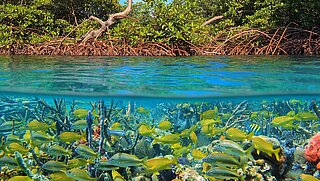Scaling Coastal Greenbelt Conservation for Climate Change Adaptation

In the Philippines, the IKI supported Centres of Learning to disseminate best practices in the preservation of coastal ecosystems.
The interlinkages between climate change and biodiversity are particularly evident in coastal areas. In the Philippines, the IKI-funded “Sustainable coastal protection through biodiversity conservation” project, has undertaken activities such as policy guidance, capacity building and awareness raising, all aimed at strengthening the natural defences provided by the country’s coastal ecosystems.
The Philippines ranks among the countries most vulnerable to the effects of climate change. Intact coastal ecosystems serve as an interconnected network of natural defences, shielding against typhoons, storm surges and other coastal threats. However, heavily degraded coastal ecosystems, influenced by human activities, provide little protection for coastal communities.
In alignment with the Philippine government’s policies and programs, the project aimed to enhance the protection of coastal areas and communities from the effects of climate change. The project’s core approach revolved around building on past and ongoing projects and initiatives, facilitating participatory implementation of best practices and the adapting of these measures to local conditions in numerous Local Government Units, focusing on the sustainable management of mangroves and protected areas.
Centres of Learning as a key element for knowledge transfer
A total of 31 Local Government Units were engaged through the work of five local NGOs (as partners), the national Zoological Society of London and the Deutsche Gesellschaft für Internationale Zusammenarbeit (GIZ) GmbH. Among these partners, six Local Government Units played a pivotal role as "Centres of Learning." These centres served as accessible hubs for disseminating proven concepts and projects in coastal and marine conservation, offering valuable resources and expertise for initiating field visits and sharing best practices.
The project supported the design, construction, and/or improvement of the Centres of Learning, provided and produced audio-visual equipment and installed information materials featuring the best practices of the centres.
A total of 25 replicate sites implemented those good practices based on their respective context and needs, which included
- developing plans for the management of marine protected areas (MPAs) and mangrove rehabilitation/ecopark plans,
- designing information, education and communication materials,
- installing marker buoys, and
- conducting underwater biophysical surveys.
Some sites adopted social marketing for their respective MPAs and are starting the process with the development of implementation plans.
National government staff, Local Government Unit personnel and community members as well as NGO and academe representatives benefitted from the project’s measures which promoted science-based mangrove and beach forest rehabilitation through trainings, webinar series, knowledge products and contributions at conferences, strengthening the conservation as well as the site- and species-appropriate planting of mangroves in coastal areas.
The link has been copied to the clipboard
Contact
IKI Office
Zukunft – Umwelt – Gesellschaft (ZUG) gGmbH
Stresemannstraße 69-71
10963 Berlin
Biodiversity and climate action in the IKI




